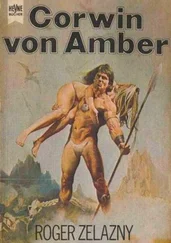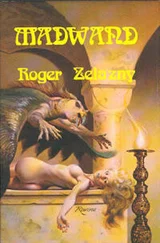He sent out the command that all the combatants should sing as they fought—even at the expense of fighting as rapidly. The result, while not miraculous, was certain.
“Destruction cannot answer destruction; creation is the answer,” Jay said, certain he was correct. “I am the son of the Engineer—creator of the Brass Babboon, programmer of sites, designer of that very palace in front of us. I was only half right when I said that we could not use the living to fight Death’s troops. What I should have realized is while our dead ghosts cannot be killed, neither can the other troops, since they’re formed from the discarded materials of this place and bound by moire. We need the creative force of music to make them lie still.”
Alice paused in her duet with Drum of “Amazing Grace.” The detective carried on, his voice rasping but surprisingly pleasant.
“Something still is leeching away at our forces, Jay.”
“Then we need to win the palace before we’re alone and too hoarse to carry on. I wish I knew the layout better. Going in the front door seems foolish. Perhaps Dubhe…”
The spidery monkey could not sing, but hanging by his tail left him four limbs with which to fling strange attractors. He had been taking the occasional bite out of his arsenal and as a result his usually dark coat was pointed with rustling lights, like illuminated fleas.
“Sorry, Jay. I never spent much time here. I came to report, but mostly I’ve kept an eye on you.”
The voice of John D’Arcy Donnerjack spoke from Jay’s wrist.
“I can be of assistance at this point, Jay. Within my memory is held the complete plans for the palace, including any number of secret passages, concealed doors, and the like that John included when he began to fear that you would be kept prisoner there. He planned for your eventual escape.”
“Well,” Jay sang, laughing, “I hope he won’t mind that we use them to break in rather than to break out. Let’s hear what you have to tell us.
* * *
The battering at the great hall door had recommenced some time after the battle had been joined, but now those who listened thought that it played a different tune.
“Desperate, now,” Tranto said. “Jay’s forces have Antaeus pressed on the field. If it cannot win here, then all this great struggle will have been for naught.”
Death’s acknowledgment caused the fabric of his cowl to move as if in a breeze.
“Ironic, too, that the doors and walls that resist the intrusion could be defined, in some senses, as the half-brothers of our opponent. But Antaeus’s claim to inheritance comes from me while the palace owes its stability to Earthma. The rejected son rejects the favorite.”
“Struggles among siblings,” Phecda mused, “are often the worst.”
A harsh breaking sound heralded the sound of wet, slopping feet mounting the stair.
“It comes,” Death said, “and unlike Jay’s forces, I cannot sing.”
“Alasss,” hissed Phecda, “neither can I.”
“Nor I,” said Tranto. “Though I can trumpet.”
Mizar only whined. Picking up the music box carefully in his spike-toothed mouth, he laid it at Death’s feet. The slim, cowled figure lilted it with a white hand.
“I doubt that this carries the song to charm Earthma’s savage son, faithful hound, but my thanks.”
The inner door did not delay the intruders for more than a few moments. It burst open with a great splintering of wood and protesting of hinges. Behind the shower of wood came Antaeus and, not so much at his heels as escorted by him, came Earthma.
Antaeus continued to resemble nothing so much as a blob of moire, uncomfortable to look upon, amorphous of form. As he entered the room, he was reshaping his mass from something four-legged and bull-headed into a vaguely humanoid shape. Head and neck were one smooth curve that split into two thick, rounded shoulders, beefy arms, squat torso, and token legs. There was no differentiation for facial features, hair, or anything else. More than anything else, Antaeus resembled a chalk outline of a truck driver’s corpse shaded in greenish black.
Earthma had manifested as a full-breasted, round-buttocked, woman clad only in a wealth of glinting emerald hair. Her skin was cocoa-toned, highlighted in green and rose. Objectively viewed, she was lovely, but none of those who looked upon her felt anything but varying degrees of fear and loathing.
“And so,” she said, when it became apparent that no one else would speak, “we at last come to this. Don’t you feel foolish for resisting, Old Death? All that effort and cleverness to arrive at what must come.”
“Must come?” Death’s voice was harsh.
“Death comes to us all.” Her laughter was fruity and rich. “Except to the immortal gods.”
“I had placed myself among those,” the Lord of Deep Fields said.
“You were wrong to do so. This is a time for change in Virtu and in Verite. One of the things that is to be transformed is the sovereignty of the Lord of Entropy. Now, as has always been dreamed, death shall be subjugated to the forces of life and creation.”
“Forgive me if I do not rejoice.”
“Of course. You always were a bitter old thing.”
“And now, Earthma. How do you plan to effect this changing of the guard?”
“My son will claim your cowled robe.”
“I wear it yet.”
“So I note. Will you hand it over?”
“I think not.”
“Pity that.”
“For you.”
Mizar growled, the rattling of rusty cans tied to broken barbed wire. A mountain shrugging, Tranto shifted from foot to foot. Emerging from the throat of Death’s robe, Phecda dripped venom from exposed fangs.
Antaeus lumbered forward a step, arms raised to bludgeon, thick gobs of moire oozing the power of unmaking.
“ Doe, re, me, fa, so, la, ti, doe !” Light and sweet, deeper and slightly out of key, miraculous, voices raised in song, music within Death’s silent Palace of Bones.
Without, on the battlefield, the Brass Babboon heard and knew his cue. He activated the recorded music stored within his workings.
“There’s a hole in the bucket, dear Liza, dear Liza. There’s a hole in the bucket, dear Liza, a hole.”
A polished panel of dark walnut swung open and from it emerged Jay, Alice, and Drum—all armed, all singing about holes in buckets, fixing and mending. The men took the part of hapless Henry; Alice carried Liza’s reply.
On the battlefield, those ghosts who had not been banished caught the sense of the song (or the nonsense) and joined in with glee. The force of the cheerful, coherent sound resisted the moire that Antaeus directed toward them. It wavered, but it did not warp, and with every futile attack Antaeus was diminished.
The Lord of Entropy was not affected, nor was Earthma, but the latter was so stunned by the turn of events that she forgot her son for long enough that Antaeus was visibly diminished by its attempt to continue the assault.
“Son!” she shrilled, but whatever she would have said was cut off by the report of a CF rifle.
Virginia Tallent stepped out of an alcove across the room, a hidden door open behind her. Her first several shots were directed into Earthma’s manifestation, but the remainder of the clip struck Antaeus solidly in the torso. She slammed another clip home and continued to fire at Antaeus.
“The whetstone is dry, dear Liza, dear Liza. The whetstone is dry, dear Liza is dry.”
Antaeus visibly weakened, but he did not fall. Nor did Earthma.
“Creation and chaos are not enough,” the Lord of the Lost muttered, “but I believe that they have shown me what will be.”
Stooping, he touched the floor upon which he stood. His arm vanished into it. Earthma may have divined what he intended, may have intended to interpose, but the Chaos Factors that Virginia brought to bear upon her manifestation, combined with Antaeus’s steady disintegration as the CF rounds bollixed his programming and the song interrupted his moire’s coherence, was too much for her. She raged impotently as the Lord of Entropy rose.
Читать дальше





